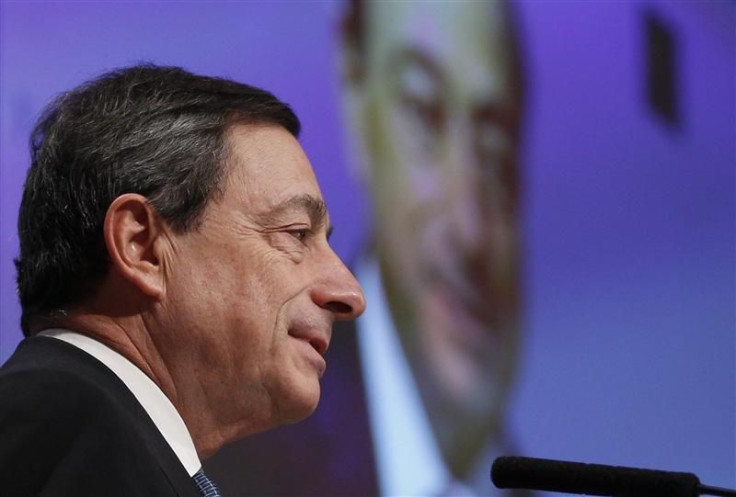ECB Bank Chief Draghi Urges Action on Rescue Fund

European Central Bank chief Mario Draghi told euro zone governments Friday to act fast to get their rescue fund up and running, expressing exasperation at their lack of progress in response to an escalating debt crisis.
With the ECB under intense pressure to play a greater role in tackling the euro zone crisis, Draghi said governments had failed to put into practice decisions underpinning the European Financial Stability Facility -- the rescue fund which they have promised to give more firepower without yet explaining how.
Where is the implementation of these long-standing decisions? Draghi said at a banking conference in Frankfurt. We should not be waiting any longer.
While the ECB, with strong German support, is anxious to remain free from political interference and resisting calls from some European governments to take major action in response to the spreading debt crisis, it has made limited bond purchases that have steadied investors' nerves.
European shares trimmed losses, helped by falling Italian and Spanish bond yields after the ECB intervened again to buy debt in the secondary market.
Deutsche Bank Chief Executive Josef Ackermann said European states could not rely on the ECB to solve the euro zone debt crisis. The ECB's primary role should not be to take up these bonds, he said.
Euro zone governments have set a December deadline to strengthen the EFSF but these efforts have been undermined by delays, surging borrowing costs and scant investor interest.
Italy's new government has announced far-reaching reforms in response to the European debt crisis.
Prime Minister Mario Monti unveiled sweeping reforms to dig the country out of crisis and said Italians were confronting a serious emergency.
Monti, who enjoys 75 percent support in opinion polls, comfortably won a vote of confidence in his new government in the Senate Thursday, by 281 votes to 25.
He faces another confidence vote in the Chamber of Deputies, the lower house, Friday, which he also expected to win comfortably.
Only if we can avoid being seen as the weak link of Europe can we contribute to European reforms, said Monti, who was sworn in Wednesday as head of a government of experts after a rushed transition from the discredited Silvio Berlusconi.
GREEK CRACKS
In Athens, Greece's national unity government was submitting an austerity budget to parliament, a first step toward meeting the terms of an international bailout it needs to avoid bankruptcy.
But already a widening rift between the coalition's main parties was apparent.
Technocrat Prime Minister Lucas Papademos must obtain the endorsement of the rival parties that they will do what it takes to meet the terms of the aid deal and persuade Greece's lenders to release emergency funds it needs to avoid default in mid-December, plus more longer-term financing later.
In Rome, Monti outlined a raft of policies including pension and labor market reform, a crackdown on tax evasion and changes to the tax system in his maiden speech to parliament.
He later spoke to French President Nicolas Sarkozy and German Chancellor Angela Merkel, who all agreed on the need to accelerate reforms, the three leaders said in a joint statement.
With Italy's borrowing costs now at unsustainable levels, Monti will have to work fast to calm financial markets, given that Italy needs to refinance some 200 billion euros ($273 billion) of bonds by the end of April.
But no amount of austerity in Greece, Italy, Spain, Ireland and France is likely to convince the markets without some dramatic action in the shorter term, involving the ECB.
Many analysts believe the only way to stem the contagion for now is for the ECB to buy up large quantities of bonds, effectively the sort of 'quantitative easing' undertaken by the U.S. and British central banks.
Euro zone officials hope that if Merkel and others find themselves staring into the abyss, the unthinkable will rapidly become thinkable.
Merkel and British Prime Minister David Cameron will try to resolve opposing views on the euro zone crisis Friday, after Berlin accused London of being selfish about Europe in comments that touched off British sensitivities about German bossiness.
The outlines of a potential deal became clearer ahead of the Berlin meeting as the Financial Times reported that Cameron would be prepared to back Merkel's plans to strengthen economic union in the eurozone, on condition he wins safeguards to protect the City of London from European legislation.
Cameron will restate his opposition to a Franco-German proposal for a so-called Tobin tax on financial transactions, which Britain believes would have a withering effect on its financial district, the FT said in an unsourced report.
($1 = 0.734 Euros)
(Editing by Mike Peacock)
© Copyright Thomson Reuters 2024. All rights reserved.





















